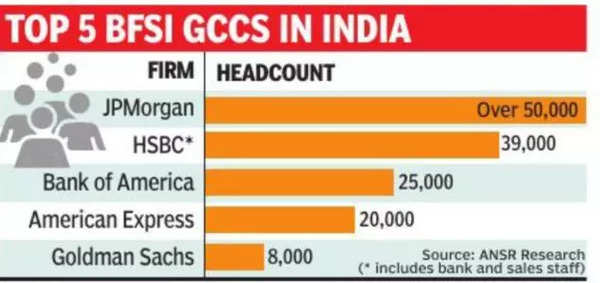[ad_1]
Recently, UK-based financial services major Lloyds Banking Group opened its new technology centre in Hyderabad.It plans to grow its talent base to 600 technologists by this year-end. Last year, Australia’s largest bank the National Australia Bank (NAB) set up the NAB Innovation Centre India with nearly 1,000 employees hiring engineers, data scientists, credit assessment analysts and financial crime operations experts among other roles. During the same period, London-based fintech player Revolut invested Rs 340 crore into its India operations.
With many BFS GCC players setting up shop in India, there is a resurgence of insourcing work in the BFSI sector. While these GCCs engage in high-value work, some of the talent is expected to gravitate to these tech centres.
Kotak Institutional Equities report showed that insourcing in the BFSI space is not restricted to an isolated incident. “Earlier, we believed insourcing could be limited to select vendors with weaker quality of delivery and high attrition, but it appears to be across a broader range of companies. We note that TCS stands to lose from insourcing by Transamerica. Tech Mahindra indicated insourcing pressure in top account(s). Mphasis is at risk of getting impacted by insourcing by a few top accounts. Cognizant could be impacted by insourcing in a few clients as well,” the report said.
ANSR’s research showed that over 90 BFSI enterprises run 185 GCCs in India. Many firms have more than one centre in the country. India’s installed BFSI GCC talent pool has grown threefold to 3.2 lakh to 3.6 lakh in 2023 compared to 1 lakh in 2010. BFSI GCCs are playing a key role in shaping cybersecurity-as-a-service, risk advisory and management, ESG reporting, sustainable financing, and regulatory compliance.

Ramkumar Ramamoorthy, partner at Catalincs and former Cognizant India CMD, “While there will be some cannibalization of revenue and opportunity loss because of insourcing, I expect the strong upsurge in GCCs to result in newer business models. We will see IT companies incubate GCCs, sub-lease and co-locate them within their facilities, as well as co-innovate with them. Just as hybrid work models are evolving, we will see newer co-opetition models evolve in this space.” Ramamoorthy has tracked the growth of inhouse centres in India closely. Infact, Cognizant was incubated as a captive of Dun & Bradstreet, which in turn incubated captives such as iNautix (BNY Mellon), and acquired many captives, including that of UBS, T-Systems, UnitedHealthcare, Invensys, CoreLogic, KBC and ING (Voya).
ANSR founder Lalit Ahuja said many BFSI players are pressing the reset button to ramp up its presence in cybersecurity, cloud, data protection, corporate treasury and risk modelling. India’s GCC talent pool is catalysing its efforts into newer areas powered by large language models. ANSR is a US and Bengaluru headquartered firm which specialises in assisting Fortune 500 companies to set up tech centres in India.
The optimism is visible on the ground. Real estate consultancy CBRE’s report showed that GCCs are likely to lease office space of around 60-62 million sft of space between 2023-25. Sectors including technology, BFSI and engineering & manufacturing will lead leasing activity in India. During the January-June period, GCCs have continued expansion and accounted for a 38% share in overall office space take-up across six cities. Bengaluru, Chennai, and Hyderabad cumulatively accounted for over 77% of the total GCC leasing during the same period.
[ad_2]
Source link
